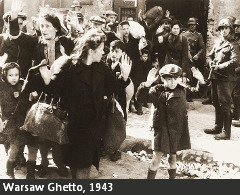The Preservation of the Jewish People: Diaspora
 (Read Part 1)
(Read Part 1)
Although many Bible students are familiar with the general developments of Jewish history until the destruction of Jerusalem in AD 70, few have any familiarity with their history between that fateful date and the twenty-first century. It is not a pretty story. Although a small remnant of Jews always continued to live in the land of their forefathers, the vast majority sojourned in the diaspora (literally the “scattering”), a technical term for those lands outside of the land of Israel. They were guests in foreign countries—“aliens” and “exiles” would be a more appropriate term for their plight. Their hosts, moreover, were far from anything deemed “hospitable.”
No matter where they wandered in the medieval world, the Jewish people never had citizenship open to them in any country. Not only were they often hated as a group, they were also often caught between warring factions and suffered the consequences. When the European Crusaders launched their expeditions in the eleventh through the thirteenth centuries to free the Holy Land from the Muslims, they slaughtered dozens of Jewish communities along the way. When the Black Death spread through Europe in 1348-1350, many blamed the Jews for poisoning wells and burned thousands, especially in Germany. Even the Pope, not always a friend to the Jews, opposed such baseless accusations, but the mob could not be dissuaded from their blind hatred.
The infamous Inquisition, launched by Ferdinand and Isabella, led finally to their complete expulsion from Spain in 1492 and then from neighboring Portugal in 1496. The forced exile of nearly two hundred thousand people, simply for the crime of being Jewish, left an indelible mark both on the Jewish psyche and also on subsequent Jewish history. The Russian Czar in the nineteenth century often blamed the Jews for whatever economic ills beset the serfs in his empire. Beginning in 1881, the infamous “pogroms” broke out sporadically, when Jewish communities were attacked by local mobs who were often urged on by their Orthodox priests to murder and banish these so-called “Christ-killers.” While thousands died, hundreds of thousands fled to the New World. Those who somehow survived to live on in the lands of Eastern Europe eventually faced the worst of all Jewish tragedies—the Hitler Holocaust. From 1933-1945, through a series of repressive laws, then labor camps and finally gas chambers, the Nazis obliterated nearly 6,000,000 people whose only crime was being Jewish.
And yet they somehow survived as a people. Other examples of exiled people groups dot the landscape of human history. The Jews are not alone in their suffering. But the suffering of the chosen people has been unique in some ways. Never has there been a people who have been exiled from their homeland and lost their national existence and language, who then returned as a people to that ancient homeland and even revivified their ancient tongue. Never has there been such a people in history, except for one significant exception—the people of Israel.
How can this be explained? Next we will look at some human explanations then suggest another explanation.
Will Varner Bio
Will Varner is Professor of Bible & Greek at The Master’s College. He earned a BA from Bob Jones University, MA from Dropsie College, MDiv and ThM from Biblical Theological Seminary and EdD fromTemple University. He blogs at DrIBEX Ideas.
- 2 views
Martin Gilbert’s book Israel: A History is a very good read in this regard.
Tyler is a pastor in Olympia, WA and works in State government.



Discussion